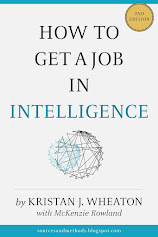“Indeed, experiments have shown that the more mental work readers have to do to infer a cause from a set of facts, the more memorable the causal inference will be.” – The Trouble With Intuition, Daniel J. Simons and Christopher F. Chabris
While I wanted games to be a central tool within the context of the class, I established some fairly rigorous pre-conditions for myself before deciding which games and how exactly they would be used in class.
First, I did not want the games to detract from the project. The experience gained from working on a real world project for a real world decisionmaker trumped, in my mind, any value games might bring to learning the essential lessons of strategic intelligence. In addition, these projects have significant tangible value to the students beyond the knowledge they gain from them. In many cases over the years, these projects have led to jobs (or at least job offers) either directly or indirectly.
First, I did not want the games to detract from the project. The experience gained from working on a real world project for a real world decisionmaker trumped, in my mind, any value games might bring to learning the essential lessons of strategic intelligence. In addition, these projects have significant tangible value to the students beyond the knowledge they gain from them. In many cases over the years, these projects have led to jobs (or at least job offers) either directly or indirectly.
I was worried that the games might detract in two specific ways. First, the games were to add value, if at all, to only that 20% of the class that was indirectly involved with the project. I did not want to create an environment where a student felt they had to choose between playing a game and getting work done on the project.
Second, I did not want the course to become about the game or games. I know from experience that games can be genuinely compelling. There are many good strategic simulations (Diplomacy, The Total War series) around which a strategic course could easily be built. In these cases, I saw the games not just competing for time with the project but actually overwhelming the project completely.
Second, I did not want the course to become about the game or games. I know from experience that games can be genuinely compelling. There are many good strategic simulations (Diplomacy, The Total War series) around which a strategic course could easily be built. In these cases, I saw the games not just competing for time with the project but actually overwhelming the project completely.
Beyond the potential for distraction from the project, the games I did select needed to resonate in a meaningful way with the core concepts of the course. I either needed a single game through which I could articulate all of the core concepts of the course more or less in the order they needed to be presented (which proved impossible to find) or find a number of different games which could help me accomplish the same goals. Of course, if I were to use a number of games, the time to learn the new rules of each game would become a factor as well.
If I were to use a number of games, then I also believed I needed to include a variety of game types and genres. I know from experience that not all game types appeal to all game players. In fact, I believe that one of the major hurdles to overcome with regard to game-based learning will be the re-packaging of core concepts in any given subject into a variety of game genres such that at least one approach will work for every student.
Finally, I was very conscious of the cost. Textbooks are expensive and I believe that, in many cases, they are unreasonably so. I could not see adding to that burden.
In the end, I settled on using casual online or downloadable games or games, such as World Of Warcraft, that came with free trials (for a complete list of the games and the core concepts, I will include the syllabus to the course in the last post in this series). The exception to this general rule was the addition of one "old-school", paper-pencil wargame, Defiant Russia (pictured above).
Students were required to play the game before each class. In addition, students were required to come to some defensible conclusion about how the game related to the topic of that particular class and to be prepared to discuss it when they came to class. I indicated to the students that the relationships between the games and the topics were rarely obvious and that in some cases there were many possible defensible conclusions. In many cases, I informed them, there might appear, on the surface, to be no real connection between the game and the topic. I wanted them to have to think hard about the possible connections, to evaluate them and to come to a conclusion that they were prepared to defend.
Classroom time was devoted in part to examining what the students saw compared with what I saw as the essential connections. A careful matching of games and topics yielded a fairly high overlap between what the students saw and what I hoped they would see. In addition, I had the genuine pleasure of having students come up with unique and deep interpretations far beyond my expectations (I will discuss this in greater detail in the subsequent posts).
To give a sense of how this worked in practice, in the class where we discussed strategic intelligence requirements (i.e. the questions that intelligence professionals are asked at the strategic level), students had to play World of Warcraft (WOW) or some other quest-based game. While there are many defensible answers to the question regarding the connection between WOW and intelligence requirements, I was able to leverage the student's experience with a well-formed "quest"(typical of the high-end MMORPGs) and contrast it with the consequences of poorly formed intelligence requirements. This, in turn, gave the students a unique perspective on their upcoming meeting with their decisionmaker where they would be receiving the intelligence requirement relevant to their particular project.
To give a sense of how this worked in practice, in the class where we discussed strategic intelligence requirements (i.e. the questions that intelligence professionals are asked at the strategic level), students had to play World of Warcraft (WOW) or some other quest-based game. While there are many defensible answers to the question regarding the connection between WOW and intelligence requirements, I was able to leverage the student's experience with a well-formed "quest"(typical of the high-end MMORPGs) and contrast it with the consequences of poorly formed intelligence requirements. This, in turn, gave the students a unique perspective on their upcoming meeting with their decisionmaker where they would be receiving the intelligence requirement relevant to their particular project.
As a result of my experience with the first two classes, I required the third class in which I used this approach to write down their conclusions and post them to a discussion board on Mercyhurst’s Blackboard course management software prior to class. This writing assignment was modest (100-150 words) but it allowed me to better prepare for the class itself.
While students were required to play the game and to come to a conclusion, I also made a wide variety of supplemental readings available. These provided "hints' to the connections between the game and the topic that I saw. I believed that, in some cases (particularly where the material was more in the way of a review), students would be able to come to reasonable conclusions without any additional reading. I also believed that students that were not overly familiar with the topic under consideration would be more engaged in the reading if they were working to answer a question, even one as difficult as the one I posed.
Next:
So, how did it all work out?
Additional Readings:
School Uses Video Games To Teach Thinking Skills
Next:
So, how did it all work out?
Additional Readings:
School Uses Video Games To Teach Thinking Skills







2 comments:
http://en.wikipedia.org/wiki/R.U.S.E.
There's many <a href="http://www.boardgamebeast.com/teaching-games.html>teaching games using board games</a>. I have a friend in Japan who runs an entire university course using board games to TEFL.
Post a Comment